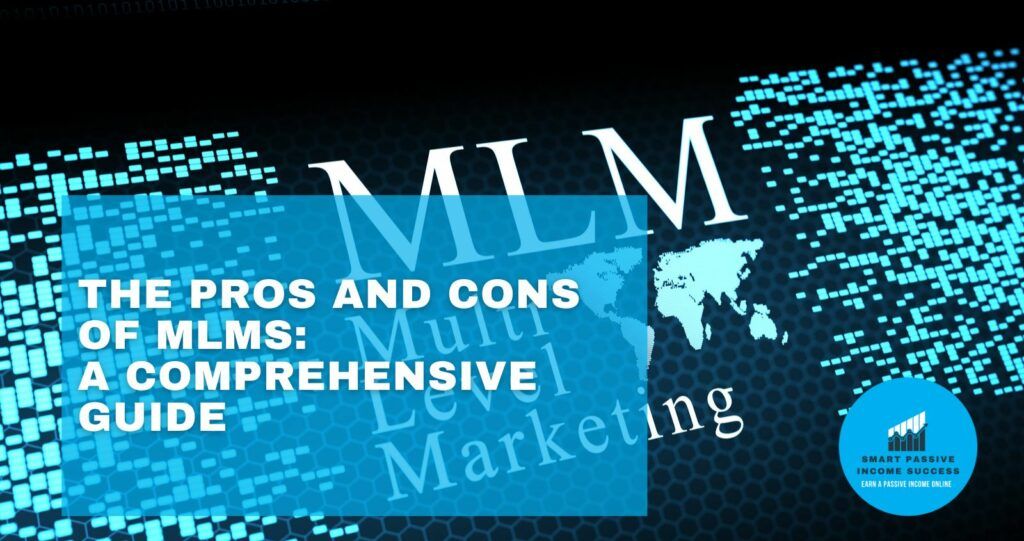Have you ever been approached by a friend or acquaintance who wanted to tell you about an “exciting new business opportunity”?
Chances are, they were trying to recruit you into their MLM (multi-level marketing) scheme.
MLMs have become a popular source of passive income in recent years, with companies like Amway, Herbalife, and Avon promising the chance to earn money while working from home.
But are MLMs really a legitimate way to make money, or are they just a cleverly disguised pyramid scheme?
In this comprehensive guide, we’ll take a deep dive into the world of MLMs, exploring the pros and cons of this controversial business model.
Whether you’re considering joining an MLM or just curious about this phenomenon, this post will provide you with everything you need to know.
Table of Contents
What is an MLM?
MLM stands for Multi-Level Marketing, which is a business model in which participants earn commissions from selling products and recruiting new members to the company.
MLMs typically involve a hierarchical structure in which participants at higher levels earn commissions not only from their own sales, but also from the sales of the people they recruit, as well as the sales of the people recruited by those they have recruited, and so on.
MLMs have also been referred to as direct selling, network marketing, and referral marketing.
While some MLMs operate legitimately and offer a valid income opportunity, others have been criticised for operating as pyramid schemes, which are illegal and unsustainable business models that rely primarily on the recruitment of new members rather than the sale of products.
There is an opportunity to make money with an MLM, but first you need to understand the pros and cons of MLM’s before you decide whether it’s the right direction for you… Let’s start with the pros…
Recommended Post: Affiliate Marketing Vs MLM: All You Need To Know in 2023
The Pros of MLMs

While MLMs have their fair share of critics, there are also many people who have found success and fulfilment in this unique business model.
In this section, we’ll explore some of the potential benefits of MLMs, including the flexibility to work from home, the low start-up costs, and the potential for passive income.
We’ll also discuss how MLMs can offer opportunities for personal development and a sense of community that can be difficult to find in other types of businesses.
1. Offers Flexibility
MLMs offer the flexibility to work from home or anywhere with an internet connection, allowing individuals to set their own hours and work around other commitments. This can be particularly attractive for people who are looking for a side hustle or a way to earn extra income while juggling other responsibilities.
2. Low Start-up Costs
Compared to traditional businesses, MLMs typically require very little investment to get started. In many cases, all you need to do is purchase a starter kit or a small amount of inventory, which can be much more affordable than the costs associated with starting a brick-and-mortar business.
3. Potential for Passive Income
MLMs offer the potential to earn passive income by building a team of people who also sell products and recruit new members. This means that once you have established a successful team, you can continue to earn income even if you are not actively working.
4. Personal Development
MLMs often provide training and support to help their members succeed, which can include personal development resources like books, seminars, and online courses. This can be a valuable opportunity to learn new skills and develop personally and professionally.
5. Sense of Community
MLMs often have a strong sense of community, with members supporting and encouraging each other as they work towards their goals. This can be a particularly appealing aspect for people who are looking for social connections and a sense of belonging.
Overall, while there are certainly valid criticisms of MLMs, these pros highlight some of the potential benefits of this business model for an individual looking for a unique way to earn passive income.
MLM Success Stories
Here are some examples of successful MLM companies and individuals, and how they achieved their success:
Amway: Amway is one of the most well-known MLM companies in the world, with over 3 million distributors in more than 100 countries. The company was founded in 1959 and has since grown to become a multi-billion dollar enterprise. Amway’s success is due in part to its focus on high-quality products, such as Nutrilite supplements and Artistry skincare, and its emphasis on building long-term relationships with customers and distributors.
Mary Kay: Mary Kay is a cosmetics MLM company that was founded in 1963 by Mary Kay Ash. The company is known for its high-quality skincare and makeup products, as well as its strong focus on empowering women. Mary Kay has been incredibly successful, with over 3.5 million independent beauty consultants worldwide. The company’s success is due in part to its emphasis on personal relationships and its commitment to providing excellent training and support to its consultants.
Robert Kiyosaki: Robert Kiyosaki is an author, entrepreneur, and motivational speaker who is perhaps best known for his book “Rich Dad Poor Dad”. Kiyosaki has also been involved in several MLM companies over the years, including Amway and Herbalife. While Kiyosaki’s involvement in MLMs has been controversial, he has spoken positively about the potential for MLMs to offer financial freedom and personal growth.
Eric Worre: Eric Worre is a network marketing trainer and author who has become one of the most respected voices in the MLM industry. Worre is known for his focus on education and personal development, and has helped thousands of people achieve success in their MLM businesses through his training programs and books.
These are just a few examples of successful MLM companies and individuals. Each of these success stories has been built on a combination of factors, including high-quality products, strong relationships, and a commitment to personal growth and development. By studying these success stories, aspiring MLM entrepreneurs can gain valuable insights into what it takes to build a successful MLM business.
The Cons of MLMs
While MLMs can offer a potentially lucrative business opportunity, there are also some significant downsides to consider.
From high failure rates to the pressure to recruit new members and purchase products, MLMs can be a challenging and sometimes risky business venture.
In this section, we’ll explore the main criticisms of MLMs and discuss the negative experiences that some people have had with this type of business opportunity.
It’s important for individuals considering an MLM to be aware of these potential downsides and to carefully evaluate the risks and benefits before making a decision.
1. High Failure Rate
One of the biggest criticisms of MLMs is their high failure rate. Many people who join MLMs do not make any significant income, and may even lose money on the products they purchase or events they attend. Did you know that between 73% and 99% of MLM members end up losing money??
2. Financial Loss
Some people have invested significant amounts of money in an MLM business, only to find that they were unable to make a profit. This can lead to financial loss and debt, which can be particularly devastating for individuals who were already struggling financially.
3. Pressure to Buy Products
In order to remain active in an MLM business, members may feel pressure to purchase products or attend events. This can create a situation where members spend more money on the business than they earn, leading to financial loss.
There is also the need to buy products to remain active in some MLMs. If you aren’t able to make sales, you will need to buy the products yourself to remain active.
This can mean you end up with a cupboard, or even a storage unit, full of products. These all cost you money and if you’re not making any money, you’ll be losing money.
4. Need to Recruit
MLMs often require members to recruit new members in order to earn income. This can create a situation where the focus is more on recruiting than on selling products, and can make it difficult for members to achieve significant income without a large and active downline.
5. Damaged relationships
MLMs often require members to recruit new members, and this can strain relationships with friends and family members. For example, some people may feel pressure to buy products or join the business in order to support a friend or family member, even if they are not truly interested in the opportunity.
6. Mental health issues
Some people have had negative experiences with MLMs, including financial loss, damaged relationships, and mental health issues. For example, some people may feel pressured to buy products or recruit others, which can strain relationships with friends and family members.
Others may experience anxiety or depression as a result of the stress and pressure associated with MLMs.
7. Legal issues
Some MLM companies have faced legal issues related to their business practices, such as accusations of pyramid schemes or deceptive marketing practices. These legal issues can create additional stress and uncertainty for members of the company.
It’s important to note that while the criticisms and negative experiences associated with MLMs are valid, they do not apply to all MLMs or all people who participate in them. Nevertheless, individuals considering an MLM business opportunity should be aware of these potential downsides and carefully evaluate the risks and benefits before making a decision.
Turn Your Passion into Profits
The Legal and Ethical Issues Surrounding MLMs

While MLMs can offer a potential income opportunity and the chance to be your own boss, they have also been the subject of legal and ethical controversy.
MLMs have been accused of operating as pyramid schemes, using deceptive marketing practices, and exploiting vulnerable populations.
In this section, we’ll explore the legal and ethical issues surrounding MLMs and discuss the potential risks and drawbacks of participating in this type of business opportunity.
It’s important for individuals considering an MLM business opportunity to be aware of these issues and to carefully evaluate the risks and benefits before making a decision.
Here are some potential points to raise in a discussion of the legal and ethical issues surrounding MLMs:
1. Getting Labelled a Pyramid Scheme
One of the biggest legal issues surrounding MLMs is the accusation that some MLMs are actually pyramid schemes.
Pyramid schemes are illegal business models that rely on recruitment rather than sales to generate income.
MLMs can be accused of being pyramid schemes if they require members to buy large amounts of inventory or recruit a certain number of new members to earn income, rather than focusing on selling products.
When checking out any potential MLM business opportunity, make sure to check for signs that it could be a pyramid scheme. This video is a great resource to help…
2. Deceptive marketing practices
Some MLMs have been accused of using deceptive marketing practices, such as making false or exaggerated claims about the benefits of their products or downplaying the risks and costs associated with the business opportunity.
This can lead to individuals making uninformed decisions about joining the business or purchasing products.
3. Exploitation of vulnerable populations
MLMs often target vulnerable populations, such as stay-at-home parents, retirees, or low-income individuals.
While MLMs can offer a potential income opportunity, they may also exploit these populations by making unrealistic promises or encouraging them to invest more money in the business than they can afford.
4. Pressure to recruit and buy products
As discussed earlier, MLMs often require members to recruit new members and purchase products in order to earn income.
This can create a situation where the focus is more on recruitment and sales than on providing value to customers or offering a legitimate business opportunity.
This pressure can also lead to individuals spending more money on the business than they earn.
5. Damage to personal relationships

MLMs can put a strain on personal relationships, as members may feel pressure to recruit friends and family members or to sell products to them.
This can create a situation where personal relationships are damaged or even destroyed as a result of the business opportunity.
It’s important for individuals considering an MLM business opportunity to be aware of these legal and ethical issues and to carefully evaluate the risks and benefits before making a decision.
Additionally, regulatory bodies and consumer protection agencies have an important role to play in ensuring that MLMs are operating legally and ethically.
The Pros and Cons of MLMs - Conclusion
In conclusion, MLMs can be a potentially lucrative business opportunity for those willing to put in the work and build a strong network of customers and recruits. However, they also come with significant risks and potential downsides, including high failure rates, pressure to recruit new members, and legal and ethical concerns.
If you’re looking for a lower-risk and more sustainable way to earn passive income, affiliate marketing might be a better option to consider. With affiliate marketing, you promote products and services on behalf of companies and earn a commission for each sale made through your unique affiliate link. Unlike MLMs, you don’t need to recruit new members to earn income, and you have more control over the products you promote and the marketing strategies you use.
So if you’re interested in exploring the world of passive income and online marketing, we encourage you to look into affiliate marketing as a viable alternative to MLMs. With the right strategy and mindset, you can build a successful affiliate marketing business and enjoy the benefits of earning passive income on your own terms.





